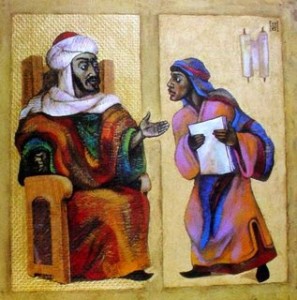“Let’s Talk About Sex”–opps, I mean Money
“And his master commended the dishonest manager because he had acted shrewdly; for the children of this age are more shrewd in dealing with their own generation than are the children of light. And I tell you, make friends for yourselves by means of dishonest wealth so that when it is gone, they may welcome you into the eternal homes.” —Luke 16:8—9
 This week’s lesson from Luke 16:1—13 is considered one of the most confusing parables in the gospels—and not only because it talks about money! One resource suggests that we can take comfort in our confusion since Luke himself offers four interpretations after the parable ends: a) The children of the light need to act more shrewdly; b) Christians should make friends by “dishonest wealth”; c) If you’re not faithful with dishonest wealth, who will trust you with the true riches? and; d) You cannot serve two masters.
This week’s lesson from Luke 16:1—13 is considered one of the most confusing parables in the gospels—and not only because it talks about money! One resource suggests that we can take comfort in our confusion since Luke himself offers four interpretations after the parable ends: a) The children of the light need to act more shrewdly; b) Christians should make friends by “dishonest wealth”; c) If you’re not faithful with dishonest wealth, who will trust you with the true riches? and; d) You cannot serve two masters.
The multiple explanations notwithstanding, what makes it most challenging for me is the suggestion that the dishonest fellow’s business dealings are something to be praised. He steals from his boss all along and then when he is fired, he goes out in what seems to be bold self-service and steals even more by reducing the debt owed his former employer. How can this be praise worthy behavior!?!
Some commentators suggest that the employer is simply commending the manager for responding shrewdly to a difficult circumstance. The word for “shrewd” here (phronimos) can also be translated as “prudent” or “wise” (16:8). But when you consider the parable from the standpoint of the manager’s relationships we might gain some new insight.
Perhaps, even though he is a sinner looking out for his own interests, he models a behavior in this desperate act that disciples would want to emulate. Perhaps, he is considered shrewd because he transforms a bad situation into one that benefits both himself and others. Perhaps, by releasing the debt of the other, he uses money to transform the relationship in a positive way. Now his connection is based “not on the vertical relationship between lenders and debtors (rooted in monetary exchange) but on something more like the reciprocal and egalitarian relationships of friends… The Filipino concept of utang na loob, which literally translated means an “inner debt” or a “debt of inner gratitude,” perhaps captures something of what is being established here — a debt rooted in the shared reciprocity of friends. (Malcolm Commentary).”
Like so many other moments in Jesus’ ministry, his teaching turns things upside down. Old hierarchies are overturned and new friendships are established. The lowly debtors who had been dependent upon the manager for their livelihood, have become the givers of grace and the ones on whom the dishonest manager now depends. There is a new-found mutuality that is created in this exchange of debt—and one must wonder if that is a better way to think about money. Rather than using “dishonest” wealth to exploit, for power, personal gain, or control of another—money becomes a tool in the making of shared relationships.
Lord knows, we could all use a better way to think about—and talk about money—in fact the Lord talks about money more than any other single thing. But we are more comfortable talking about sex than we are talking about money. Yet most of us–including myself–struggle deeply with money matters. We have lots of questions (how much is enough, how much should I give away, how can I raise children who are both wise and generous, etc., etc.) and we generally misinterpret what Jesus says about money. We think that the bible tells us that “money is the root of all evil”. In fact Jesus said it is “the love of money” that is the problem.
While this parable does not answer our questions, it does give us a chance to think about the questions and confusion we all carry around about money. How do we use money in a healthy manner? What is our responsibility to those who have less? How do we use money well in our human relationships? How can we use money to build the kingdom and love our neighbor?
 Might we come away from this lesson wondering if creating space for healthy and faithful conversations about money are a part of our call as a Christian community? Certainly this parable presents us with characters, not unlike ourselves, who struggle with money and our motives and the desire we have to want what we want when we want it. I pray that we all find the grace to wrestle with these questions about the relationship we have with the time, talent and treasure with which we have been gifted.
Might we come away from this lesson wondering if creating space for healthy and faithful conversations about money are a part of our call as a Christian community? Certainly this parable presents us with characters, not unlike ourselves, who struggle with money and our motives and the desire we have to want what we want when we want it. I pray that we all find the grace to wrestle with these questions about the relationship we have with the time, talent and treasure with which we have been gifted.
Rev. Wendy Miller Olapade (revwdmiller@comcast.net)
